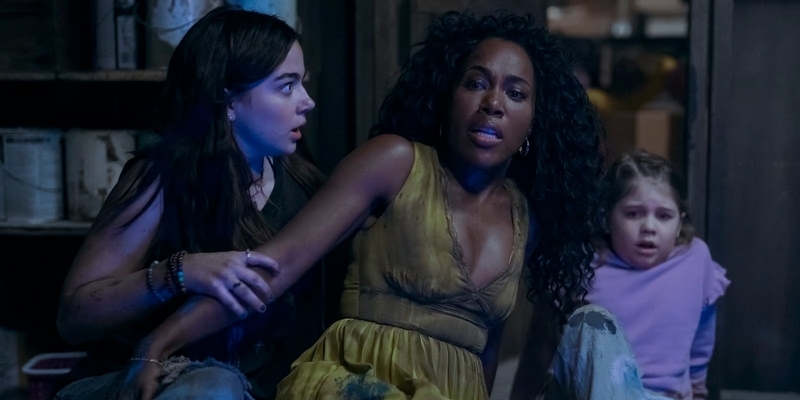
A woman grows increasingly suspicious when her young stepdaughter becomes
attached to a stuffed bear.
Review by
Eric Hillis
Directed by: Jeff Wadlow
Starring: DeWanda Wise, Tom Payne, Taegen Burns, Pyper Braun, Veronica Falcon, Betty
Buckley

I never had an imaginary friend as a child, and I've never come across
anyone else who had one either. Had my parents ever found me speaking to a
presence only I could see, they probably would have had me taken away by
the men in white coats. Horror movies would have us believe that most kids
have imaginary friends. "Oh it's just an imaginary friend," the adults in
horror movies always say when their sprogs start hosting tea parties for
invisible figures with horrific names like "Mister Wiggles" or "Doctor
Sardonicus." It's a statement that's usually followed by "Didn't you have
an imaginary friend?"
The "imaginary friends" in horror movies always turn out to be malevolent
demons using a child's innocence for nefarious purposes, but director
Jeff Wadlow's Imaginary gives us an intriguing spin
on this idea, supposing that imaginary friends are themselves evil forces
rather than a fake disguise worn by evil entities. Unfortunately the movie
has no idea where to take this idea, and it all plays out in a decidedly
unimaginative mess of expository dialogue and ideas ripped off from
previous horror and fantasy movies.

After an opening dream sequence featuring a demon that laughably looks
like a rejected Muppet we're introduced to newlyweds Jessica (DeWanda Wise) and Max (Tom Payne). An author and illustrator of children's
books, Jessica is now saddled with musician Max's two daughters -
five-year-old Alice (Pyper Braun), who is welcoming of Jessica but
somewhat distant, and 15-year-old Taylor (Taegen Burns), who treats
her new stepmom with utter contempt. Max definitely got the better end of
the bargain, as not only does Jessica have no kids of her own but she also
moves the newly blended family into the massive home now left vacated by
her father's permanent hospitalisation for psychiatric troubles. Tom's
first wife and the mother of his daughters is similarly incarcerated after
a series of psychotic episodes, one of which led to Alice being badly
scalded on her arm.
When Alice discovers a stuffed bear in the basement she names it Chauncey
and becomes convinced that it's sentient. Jessica has no recollection of
owning the bear as a child, but doesn't give it much thought. She
initially encourages Alice's mad as a hatter belief in her new imaginary
friend until the kid begins to exhibit increasingly disturbing
behaviour.

There's a ton of wasted potential in Imaginary, with lots of ideas raised only to be left unexplored in a film more
concerned with adhering to the Blumhouse template of a jump scare every 10
minutes and an overblown and overlong climax. The idea of a woman who
makes a living writing stories for children and yet can't connect to a
child in real life could fuel a movie of its own, but it's never reckoned
with to any satisfying degree here. Another thought provoking idea left on
the table here is that of the balancing act parents must perform in
fostering a child's creativity without encouraging their delusions. But
let's face it, such ideas are probably above the pay grade of the director
of Kick-Ass 2 and
the big screen adaptation
of
Fantasy Island.
A big problem here is that, like so much recent PG-rated horror, the film
doesn't seem to know if it's aiming for an adult or child audience.
Wadlow's co-writers Greg Erb and Jason Oremland come from a
background in children's entertainment, and yet the film centres on the
adult Jessica. A more interesting, dare I say Spielbergian version of this
story might have focussed on Alice rather than Jessica. The need for adult
scares could have been replaced by something far more emotionally
affecting, the idea of a child discovering that the person that means the
most to them, their imaginary teddy bear-inhabiting friend, is out to get
them. There's a moment where Alice screams "You were never really my
friend" at Chauncey, but it has none of the emotional weight it really
should carry. If handled well there isn't a dry eye in the house at this
point, as even the adults would be impacted by our collective sadness at
having to leave our childhoods behind.

It doesn't work as a children's fantasy, and Imaginary is
no more successful as a horror movie. There's a distinct lack of peril,
chiefly because unlike the titular tiny terror of
M3GAN, we never really get to see Chauncey harm anyone, not even a dog or a
cat. Not so much as a goldfish is harmed, so why are we supposed to be
terrified of this talking teddy? The "scares" are very much of the
second-hand variety, with yet another variation of the "small thing
suddenly becomes big" gag from Mario Bava's Shock, and the finale sees Blumhouse rehash "The Further" from its
Insidious
franchise by way of Neil Gaiman's Coraline with a dash of
Hellraiser II. Pure imagination? More like pure drivel.

Imaginary is on Prime Video UK now.

